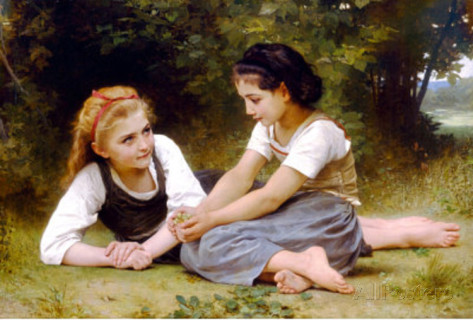
POLITE SLANG.
"OH, it's awful pretty, just too sweet for anything! May I try it on?" And Marion Hobart turned to her "dearest friend," Frances Shaw, her fair face glowing with enthusiastic admiration. "Certainly, my dear," was the reply. "Oh, you look perfectly lovely! I almost wish it was yours, only I might die of envy. Your complexion is simply perfect, and mine is just horrid. I couldn't look as pretty as you, tried I ever so hard."
"O sweetest of flatterers!" Marion replied.
"What signifies a complexion, with your superb hair and eyes? And think how splendid it is to have all the money you want to buy pretty things.
Oh dear! I think I'm the one to die of envy."
"Why,. Marion!" said a gentle voice, in sad, reproachful tones.
"For pity's sake, Sue, where did you come from?
And what have I said that you should speak in such lugubrious tones? I didn't suppose that you
were within a mile of us."
"Well, I'm willing to confess that I'm ashamed of myself," said Frances. "Don't you remember what Dr. Mann said four years ago, when we graduated from the grammar school? There were three words he begged us not to use till we were twenty-five. The words were 'horrid, splendid, awful.'
And here we are, graduates of the High School, indulging in all sorts of extravagant expressions.
Of course, I except you, Susie: you never say anything that isn't just right."
"O France, dear," said Susie, "you are greatly mistaken there."
"No, she isn't," said Marion. "You're a sweet and patient saint.. But illness has been an armor to shield you from the fiery darts of temptation to which poor France and I have fallen victims."
"You incorrigible girl!" said Frances. "You know Sue never talked in the reckless way we do.
Although she doesn't say much about it, I know she refrains, from pure principle. And we're church-members, as well as she."
"Yes, 'in good and regular standing'; and our communication should be 'yea, yea, and nay, nay.'
And seriously, girls, I really wish to get rid of this very foolish way of talking. But the force of habit is sadly strong. Silly thoughts pop into my mind, and out they come. How can I help it, Sue?"
"Some one has said we cannot prevent the bird's flying over our heads, but we may prevent their building their nests in our hair,—a pleasant way of saying that we must not harbor evil. We are not to blame if a wrong thought enters our minds: we are to blame if we cherish it. So with regard to these reckless forms of speech. They take the place of better and more earnest thought; and it seems to me that a person must grow shallow in proportion as she indulges in such thoughtless expressions. I should say, crowd out frivolous thoughts by meditating on something higher.
Then, with the Saviour's all-powerful aid, your efforts must be successful."
—Our Young People.